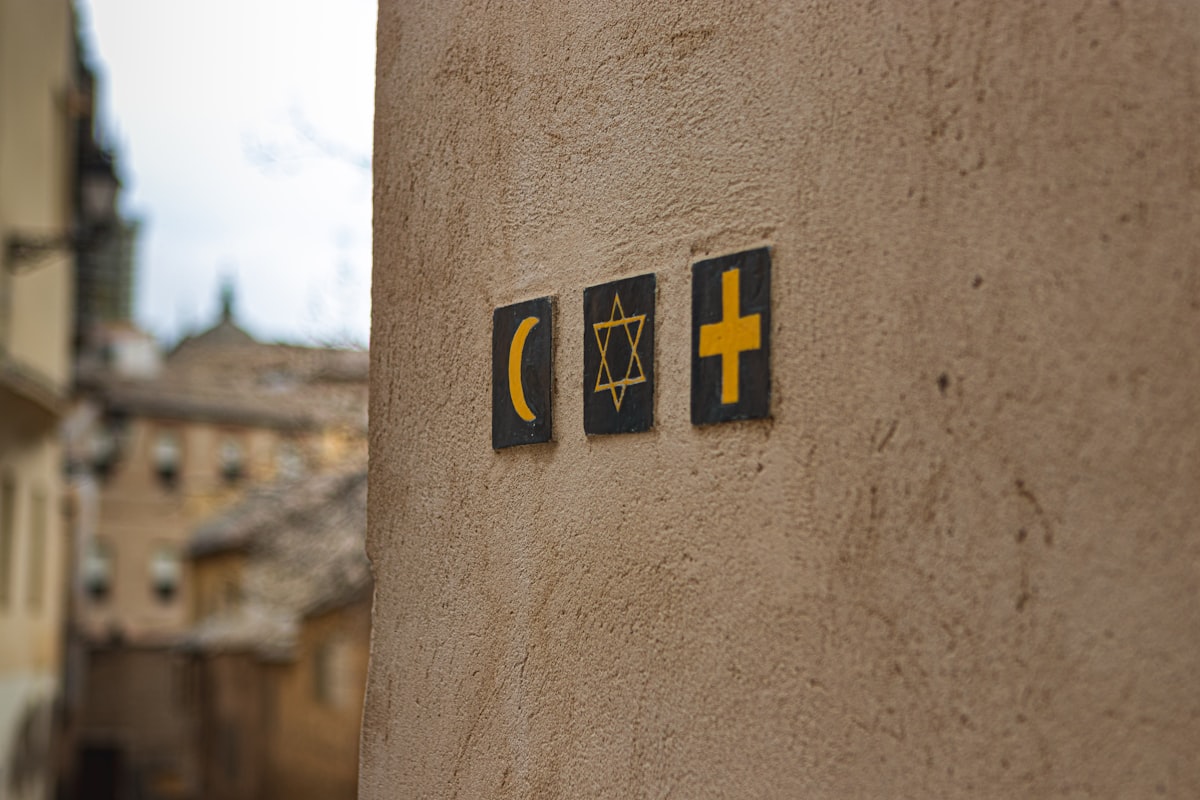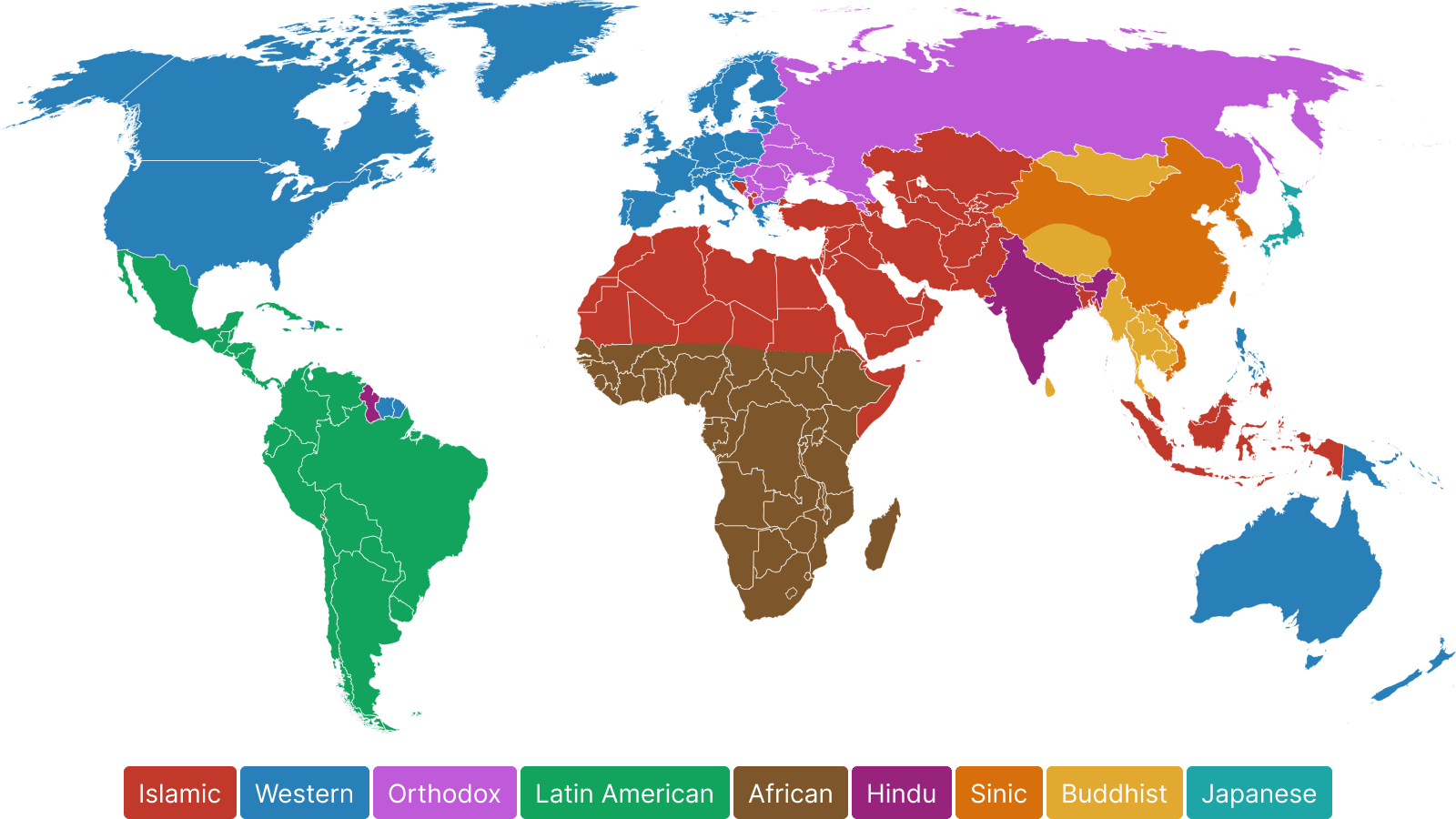
Is there really a clash of civilizations?
A 9 minutes read written by Sonia H on June 2023
It depends on who you ask.
Huntington proposed the concept of a clash of civilizations in 1992, right after the final strike to the Cold War period. It argued that the main reason for wars and conflict after the Cold War would be people's cultural and religious identities, and how they would collide against each other.
To simplify: "before" = ideological problems, "after" = cultural problems. And to reference both Huntington and Fukuyama, it's as if after the Cold War, the non-West rest of the world has to manage and adapt to the final hegemony - no more "real conflict", just cultural discrepancies.
Much has changed since then, but globalization and mass migration keep the question alive. We are more conscious of our differences because we live in societies where people from opposite sides of the world live together. That consciousness can be positive or negative - and the negative can lead to a clash. We can live together, in spite of and even, maybe, thanks to our differences. This new globalized society we've created won't go away anytime soon, so we'd better keep up.
The clash comes from fear
We fear what we don't know - that is embedded in our biology as animals and as human beings. The rational and moral approach to fear is knowledge. What seems different from us could be a potential threat, but unless we want to thrive in fear (highly unlikely) the only solution is finding out whether the Other is an actual threat.
Solution: read more, fall into the Wikipedia loop, google things around, and also ask.
Ask politely, the way you'd want to be asked why you believe in what you believe. If you've found out and seen what the Other is like and it's not your cup of tea - that's okay, you still live the way you want at your place, and the Other will live the way they want. That is, still, not a reason for a clash.
Many traditional intellectuals, like the Arab nationalists and early Islamists, studied in Europe, got acquainted with some ideas, and went back home to create their particular kind of ideology. That doesn't mean you share the same mindset, but interacting with the Other can only bring perspective. The practical consequence and what comes next is up to you.
Power chooses reality, but doesn't exclude differences
We live in a world where power and hegemony lay in the West. Progress, and the concept of progress and righteousness is crafted in the West. That, at the end, is just a matter of perspective, although well-being is tangible, as is progress, and thus is always more and more objective.
When there is lack of awareness of other cultures, nations, and civilizations, there is a lack of balanced power, which can only lead to a broader divide. The West may consider X thing right, but the West is just one of the civilizations in the planet, which would require from us to ponder the philosophical question of whether self-perception is reality. India works differently than Germany, but then again, we are not going to impose German mindset in India nor Indian mindset in Germany. It's just about realising that other countries perceive things in a different way, and may want "progress" to be their own way, often with their own traditions added into that mix.

Yes, we can say that generally the West is centered towards granting human rights and civil rights. But what is considered good derives from a social and moral set, and that varies per civilization.
It is extremely easy to fall into the trap of thinking that whatever is different is wrong. We may believe, that because we do X, everyone knows it, adopts it, and that it's their normal jam. (Like when a US citizen wished me a happy 4th July for the Independence... and I'm European)
When we travel, depending on where we go, people won't adapt to our needs, as it is most natural. We will need to adapt. What for us may be extremely normal, can be absolutely offensive for others. If there's a bit of respect, humility, and self-awareness, the process of getting to know other cultures, their differences and ways of thinking can be a bridge-building experience instead of an experience that leaves you with a confronting aftertaste.
Allowing differences: examples
No one should renounce their culture to fit in - that is like renouncing yourself. Due to globalization and international immigration, there are minorities in almost every single country - and the approach we can take towards it is either exclusive or inclusive.
To make it short: exclusive means that belonging to one culture excludes you from another, making it either black or white, whereas inclusive makes it a scale of grays where we celebrate each other's culture and share it, instead of wanting it to be one that prevails above others. The more you force X to be like Y, the more exclusive and "traditional" it will be, as there will be a confrontation for which X will feel the need to defend its culture against the predominant, mass-distributed culture today (i.e. the Western culture).
We have fortunately different practical examples on the ground to learn from, with their positive and negative sides, and one last example where the multicultural model was built from the base to the top, as opposed to fetching the multicultural card as a result of a lost hegemony.
France
A big colonialist back in the day, France launched what was called mission civilisatrice, which aimed to teach and export the French mindset to the colonised countries. That would not make them French - but they would at least have the knowledge to act and think like the French in what was French territory. This promoted a rising class of Maghreb intellectuals that used both their local Arabic and Berber dialects together with French, and who were able to understand or discuss both sides of the story.
Consequences fast forward: when you visit Paris, the subway is full of people from all over the world, who most likely feel French and Algerian, Chinese, Tunisian, Korean, Moroccan, Malian, and so on. Some now feel more French than their original background. Some feel both equally, without the need to renounce to one of both identities (inclusivity), and others feel that France is just a country that adopted them, where they happen to be born in. For many native French, though, the immigrants and descendants of immigrants aren't considered real French, as to be French means more than speaking the language and adhering to social norms in public spaces. The different lived approaches in this case has led to the banlieues problems of "ghettification".
United States
The Land of the Free had opened its doors to almost anyone back in the days - anyone if you were white, or if manpower was needed. There is the concept that the USA is set mainly by and for WASP (White Anglo-Saxon Protestants), which still are the main upper class all around the country. Although the doors are still open for many who want to live the American Dream, things are going to be much harder for you if you don't enter the WASP category. Italians weren't allowed everywhere, nor were the Irish (as Catholics, they were called Black as a sign of disrespect). Jews were allowed temporarily, then barred from entering the US shortly before the Second World War.
We could say that the United States is a fragmented society, where social class and background still play a huge role into the social tissue, until the point that, although the streets are shared, there is more than one social reality.
India
There has been much discussion lately on Narendra Modi's politics regarding minorities, and how his Bharatiya Janata Party is erasing Muslim heritage from history books. The fact that whole generations won't know the complex building blocks of their nation is alarming, but it isn't new, as there have been multiple attacks on Muslims since Modi is in power, and several mosques have been demolished. Islam is seen as the enemy, the West is to be refrained from and seen with suspicion, and Hindutva (Hindu nationalism) is seen as something to be encouraged, even in its more aggressive approaches. For a millennia-old, multicultural country like India, it is like adhering to the western nation-state model and discarding anything that differs.
Lebanon
On the other hand, there are countries that have suffered enough with their divisions, and who focus on their multicultural nature, from which they build their sociopolitical structure.
Lebanon, historical home of many religions and ethnicities, strives to represent all the country's nations equally - at least technically, although it has a lot of political problems derived from that. There isn't a one 99% majority that oppresses the 1%. It has a lot of trouble though, and many consider that this parity between tribes is what could potentially make the political reality collapse by default. Generally, the system calls for a Maronite Christian to be the President, a Shia Muslim to be the Speaker of the Parliament, and a Sunni Muslim to be the Prime Minister. This, obviously, maybe ensures some ethnic equality (except for the Druze, that aren't as represented as the others), but doesn't avoid corruption.
What about now?
Fast forward to now: Huntington and Fukuyama argued that after the Cold War, "everything would end", and conflict would be based on culture.
Well.
Right now, with the war between Ukraine and Russia, it's as if the Cold War had never finished - but the international involvement, mainly that of the West, shows some accuracy to the culture clash fact. Many second and third world countries aren't opposing Russia, much to the surprise of the United States and Europe. It's as if it would be hard for us to understand why underdeveloped nations are reticent to give support to first nations that have exploited their humanity and their resources. Why would they support the West? There is, very obviously, a conflict based on power - which we've been dragging for centuries.
As Samir Kassir said when talking about the Arab malaise:
The proliferation of the culture of death and the evening-out of differences between Shias and Sunnis cannot be explained solely by the Islamization of the fight against Israel. Over and above actual events, the media, especially Al-Jazeera, has played a key role in this process, peddling a lowest-common-denominator mix of Arab nationalism and Islamic nationalism. It was doing this before September 11, defending means, justifying ends, claiming Arab victimhood. The Arab public has been systematically primed to accept the thesis of a 'clash of civilizations'.
Being Arab
As you may have noticed, Kassir's analysis is the other side of the coin of what we can know from the West (namely radical right-wing Christians, white supremacy, and conspiration theories such as the genetic replacement). The clash of civilizations can use a magnifying glass and diversify.
On the other hand, Kassir says,
Nonetheless, we must be able to continue rebutting Huntington and remembering Lévi-Strauss. If we could address the protagonists of the 'war against terror' or the 'jihad against the crusaders' in academic terms, that ought to be surely the watchword of a new universalism.
As he also says, nowadays differences are cultivated. The 'clash of civilizations' we hear most about in the media and socially is the Christians vs. Muslims clash. It is not banal - many people don't know why they don't like Muslims, but they do recall the general culture in which the "Sarracens" (especially in Europe) came to invade and islamize the populace. Not that Muslims have an historically better view of the Christians either, who also, of course, did their share, way beyond the one of the Muslims. Those are things that are not forgotten, even if they lay at the back of one's mental upbringing. However, 'clash of civilizations' tastes like a strong word.
Wrap up
Lévi-Strauss said that civilization is not a category and cannot contain 'natural' hierarchies, and that humanity is one. As Kassir resumes from Lévi-Strauss, "it is as meaningless to talk of an 'attack on civilization' as it is to classify people according to their adherence to a faith, Muslim or otherwise".
I think we see a lot of Huntington and Lévi-Strauss nowadays. People and nations, fortunately, are not all an homogeneous block. There are groups and subgroups, and every person is determined by its personal life experience. There is violence, fear (and the subsequent hate) in almost all nations, and there are those that feel under threat because they feel their power may be taken away (USA, Russia, India, China), and those that, while not being in positions of power (second and third world countries), jump in the bandwagon of violence and radicalism because they feel an essential, second threat to their beings and culture.
An easy way to see how influenced we are by the civilizations and the "clash of civilizations" is by looking at Europe, and how its different cultures have shaped the Western world:
The South is poorer. Works a lot but isn't paid as much. People are much more social and the weather is beautiful. Mostly Catholics, except for the Greeks, who are Orthodox.
The North is much richer. Works a lot, but not as many hours, and is paid triple if not more than any southern salary. People aren't as social, and the weather isn't as kind as in the South, where warm weather calls for more social interaction and free time. Mostly Protestant. The more time you have to spend inside, the more you work.
Could all these factors - that then influenced even Protestantism and its variants - have led to different cultures inside a big European culture?
Yes. And even here in Europe we have little culture clashes between north and south - even between the north and south of single countries, as one land/country doesn't mean one people. That, of course, also applies to continents.
A clash? Some will say yes, others will deem it not as serious. That there's a culture clash it's obvious, we don't have to go very far to see that. What changes, though, is how we approach it and how we act in its regard. Whether Huntington was right or not, that depends on you.




Comment